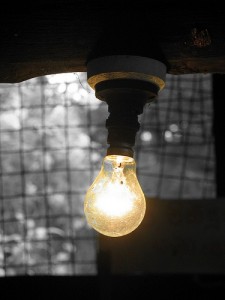“The zipper displaces the button and a man lacks just that much time to think while dressing at dawn, a philosophical hour…” – Ray Bradbury, Fahrenheit 451


In both our personal and professional lives, every day is a new challenge. Whether our goals are based in profits or something more profound, we don’t set out to do as others have done — we take our individual experiences, thoughts, and ideas, and we build upon others’ accomplishments for the better.
Creativity is essential. But not everyone is creative. Creative people aren’t lazy — they go above and beyond in seeking out information, as they are naturally curious. Their diverse interests allow them to make the abstract connections between seemingly unrelated thoughts that define innovation. Unfortunately, even as technology has allowed us to work more efficiently than ever before, it has saturated our lives to the point that it is inhibiting our ability to think creatively.
The creative process is well-studied. The first two steps involve gathering and weighing information. Since you’ve read this far, you probably have those down. Unfortunately, for that same reason, you probably haven’t given the third step its due. Step three is incubation. You walk away from the subject completely. You let your mind digest.
It’s proven that employees who are allowed to practice yoga during the work day are more productive. Still not sold? Ever had a really good idea while taking a shower? When your mind is at ease, something inexplicable happens. And creative thought depends upon that inexplicable process.
Eat lunch by yourself outside. Go for a run without your headphones in. Turn off your phone and computer, and sit down in your office for five minutes with your feet on your desk. For those five minutes, your competition will be working harder than you, but you’ll be working smarter.
In those five minutes, you may suddenly realize how to resolve a dispute at home or in the office. You may finally have the break-through insight that drives a project forward. You may do nothing more than realize that you like spending time alone with yourself. You’ll be more at ease, and wisdom will result. Something good will happen.
Image Credit: TBTAOTW2011, jaliyaj


View Comments (6)
I agree with what has been said, but creativity is also a process of doing. Get started on your project, actively think about it, and though work you might make mistakes. You might have to adjust, you might produce an unexpected outcome. You will have discovered an alternative destination. Attempts at creation are important part of the creative process. I liked this article all the same.
Salty Sloth -- great name, I'm actually intrigued as to what inspired it... and yes, creativity is more than anything a process of doing.  James Webb Young breaks the creative process into five steps in his short book, A Technique for Producing Ideas (an interesting and very quick read).  Of those five steps, three involve working, one resting, and the fifth is just the 'Eureka' moment.  In step two, you are supposed to not only work to your limit, but push past that limit until you simply can't work any longer.
I was eating pretzels and I like sloths. I often work constantly, adapting on the go, until I discover a method or result I would like to repeat. Perhaps I should familiarize myself with Young's ideas. Thanks for the recommendation.
Haha... I couldn't have asked for a better explanation. Thanks for your comments!
Creativity also seems to spawn from failure. Â If something doesn't work, how many times have you heard of it just being left alone to be of no value. Practically never. Â It would be foolish for someone to settle with no success. Therefore, it seems that it would be logical to claim that you never learn if you've never failed. The more you try, the more you have to figure out ways to change and adapt. Sometimes you fail once, sometimes you fail 1,000 times, but each failure is a lesson. Â Edison had said "I haven't failed, I've found 10,000 ways that don't work." Â Just some thoughts
Nice Edison quote Frommers! Â You really have to struggle with ideas until you can finally piece together the perfect solution. Â Failure is definitely inherent in the creative process.